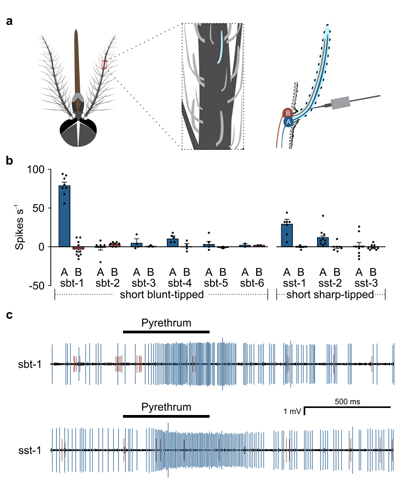
Principal Investigator
Zoology
liufeng@szbl.ac.cn
2023 - PresenShenzhen Bay Laboratory Junior Principal Investigator
2021–2023 University of California San Diego, Department of Cell and Developmental Biology Staff Research Associate
2018–2021 Vanderbilt University, Department of Biological Science Postdoctoral Research Scholar
2016–2018 Michigan State University, Department of Entomology Postdoctoral Research Scholar
2011–2016 Auburn University Ph.D.
2008–2011 Chinese Academy of Agricultural Science Master
2004–2008 Shenyang Agricultural University Bachelor
Some hematophagous insects act as the vectors of human/animal pathogens, playing important roles in the disease transmission. The main focus of our lab is studying the interactions among the insects, hosts, and pathogens, deciphering the cell and molecular mechanisms behind these interactions, and developing new strategies and methods in the management of insect vector.
Dr. Feng Liu was supervised by Professor Nannan Liu at Auburn university and received his Ph.D. degree in Entomology. After that, he continued his research training in vector biology under the mentorship of professor Ke Dong at Michigan State University, professor Laurence Zwiebel at Vanderbilt University, and professor Omar Akbari at University of California San Diego. By integrating multi-technique approaches, such as single sensillum recording, Xenopus expression system, two-electrode voltage clamp, Drosophila transgenic expression system, and CRISPR/Cas9-based gene editing, he uncovered the cellular and molecular basis of odorant reception in several disease vectors. Dr. Liu has published 31 peer-reviewed articles (19 first-authored articles) in some renowned multidisciplinary research journals, such as Nature Communications, Cell Reports, PNAS, and a wide variety of entomological journals, such as Insect Biochemistryand Molecular Biology, Frontiers in Physiology. Dr. Liu’s work has been supported by National Institute of Health (USA) and widely reported by multiple Chinese and English media, such as Scientific American, Science Daily, Sina, Tencent, and Netease.

Revealing the mechanism of pyrethrum’s repellency against Aedes aegypti:pyrethrum repels mosquito by activating olfactory sensory neurons in the mosquito antenna.

Null mutant of Ir76b mosquito presents enhanced neuronal responses to amines and insensitivity to blood. This study reveals that Ir76b gene acts an negative feedback in the neuronal responses evoked by amines and determines the blood perception of sensory neurons in the stylet of mosquitoes.
Ye, Zi*, Feng Liu*, HuaHua Sun, Adam P. Baker, and Laurence J. Zwiebel. (2022) Discrete roles of the Ir76b ionotropic co-receptor impact olfaction, blood feeding, and mating in the malaria vector mosquito Anopheles coluzzii. PNAS, 119, e2112385119.
Feng Liu*, Qiang Wang*, Peng Xu*, Felipe Andreazza, Wilson R. Valbon, Elizabeth Bandason, Mengli Chen, Ru Yan, Bo Feng, Leticia Smith, Jeffrey G. Scott, Genki Takamatsu, Makoto Ihara, Kazuhiko Matsuda, James Klimavicz, Joel Coats, Eugenio E. Oliveira, Yuzhe Du, Ke Dong. (2021) A dual-target molecular mechanism of pyrethrum repellency against mosquitoes. Nature Communications, 12, 2553.
Huahua Sun*, Feng Liu*, Adam Baker and Laurence J. Zwiebel. (2021) Neuronal odor coding in the larval sensory cone of Anopheles coluzzii. complex responses from a simple system. Cell Reports, 36, 109555
Feng Liu*, Zhou Chen*, Zi Ye, Nannan Liu. (2021) The olfactory chemosensation of hematophagous Hemipteran insects. Frontiers in Physiology, 12, 703768
Feng Liu*, Zi Ye*, Adam Baker, Laurence J. Zwiebel. (2020). Gene editing reveals obligate and modulatory components of the CO2 receptor complex in the malaria vector mosquito, Anopheles coluzzii. Insect Biochemistry and Molecular Biology, 127, 103470.